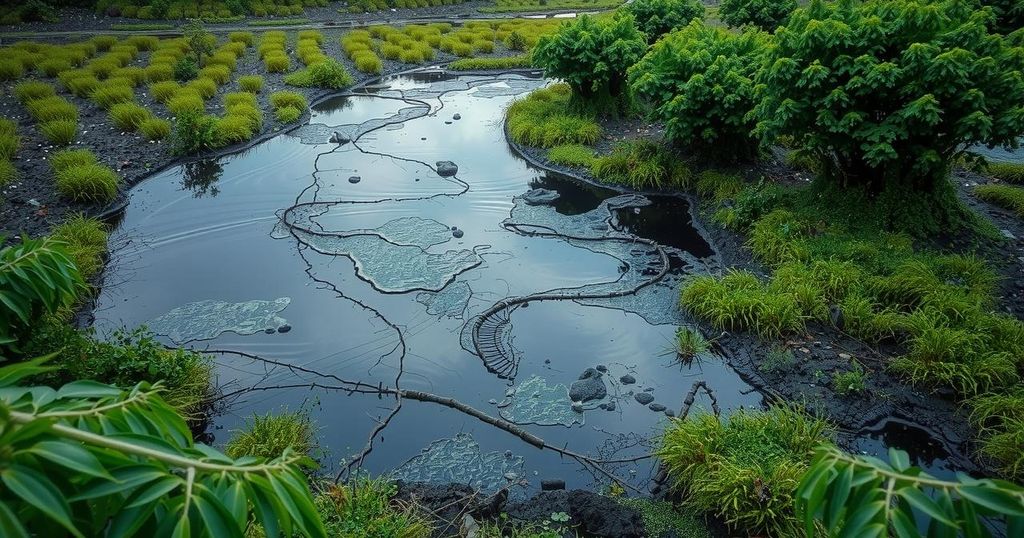Petroecuador Declares Force Majeure Following Significant Oil Spill in Ecuador
Ecuador’s Petroecuador declared force majeure on March 18, 2025, due to a catastrophic oil spill caused by a landslide on March 13. The incident has contaminated the Esmeraldas River, impacting over 500,000 residents and leading to a water crisis. With a state of emergency declared, oil exports have been suspended as the company seeks to mitigate the spill’s effects.
On March 18, 2025, Ecuador’s state oil company, Petroecuador, declared a state of force majeure concerning its Trans-Ecuadorian Pipeline System (SOTE) following a massive oil spill that originated on March 13. This incident, caused by a landslide that ruptured the pipeline, has severely impacted the Esmeraldas River and has resulted in a significant water crisis affecting over 500,000 residents.
Heavy rains and adverse weather conditions, which are believed to have triggered the landslide, have resulted in the loss of 20 lives since March 19. Following this incident, a state of emergency was declared on March 16. Consequently, Petroecuador announced the suspension of exports of Oriente crude oil, one of its primary oil varieties, anticipating that this declaration would provide necessary legal protections from penalties or breach of contract.
This emergency period will last up to 60 days and is aimed at channeling resources towards minimizing the repercussions on hydrocarbon exploration, production, transportation, and marketing. The provinces that have been most affected include Manabí, Guayas, Los Ríos, El Oro, Esmeraldas, Loja, Chimborazo, Cotopaxi, Pichincha, and Imbabura, exhibiting widespread flooding and consequent infrastructure damage.
As reported by the National Secretariat of Risk Management (SGR), 20 fatalities, 6 individuals missing, 95 injured, and 306 evacuees have been documented, along with a significant number of damaged homes. The initial spill was officially confirmed as stemming from the March 13 landslide, impacting a stretch of 32 km (20 miles) and affecting at least five rivers.
By March 17, local authorities indicated that around 15,000 individuals were directly impacted in Esmeraldas, with many living along rivers experiencing oil contamination. Estimates suggest the spill at approximately 200,000 barrels, exacerbating concerns for drinking water availability in a region that relies heavily on river sources.
In reaction to this catastrophe, Petroecuador has initiated efforts to recover spilled oil and has arranged for the delivery of drinking water to the affected areas. Furthermore, the National Emergency Operations Committee has mandated an environmental emergency across Esmeraldas province, resulting in the temporary closure of local beaches.
Marine biologist Eduardo Rebolledo reported concerning conditions, stating that the water in two affected rivers showed no life forms due to the hazardous mixture of oil and water. This underscores the urgency of addressing both the environmental damage and the critical water shortage experienced by local residents.
The ongoing situation is dire, as communities in rural Esmeraldas find it increasingly challenging to access potable water, with many depending on river systems that have now been contaminated.
In summary, the recent declaration of force majeure by Petroecuador highlights the severe consequences of the catastrophic oil spill stemming from a landslide. The incident has not only contaminated vital water sources but has also resulted in significant loss of life and property. The response efforts include temporary suspension of oil exports and the mobilization of resources to address the emergency. With over 500,000 residents affected, the implications of this environmental disaster will require continued attention and remediation efforts.
Original Source: watchers.news




Post Comment